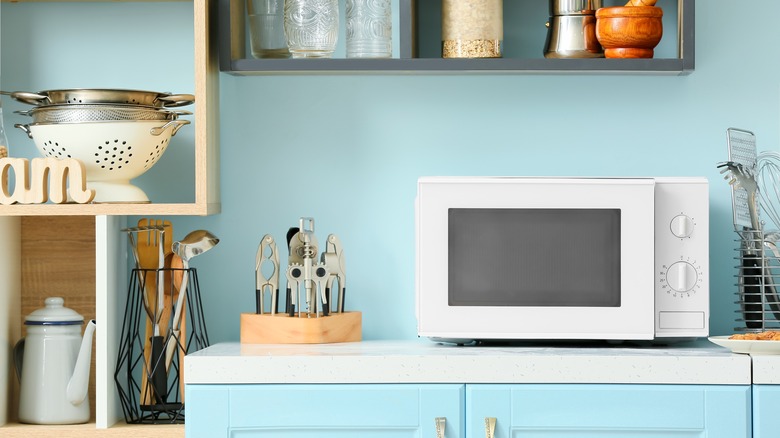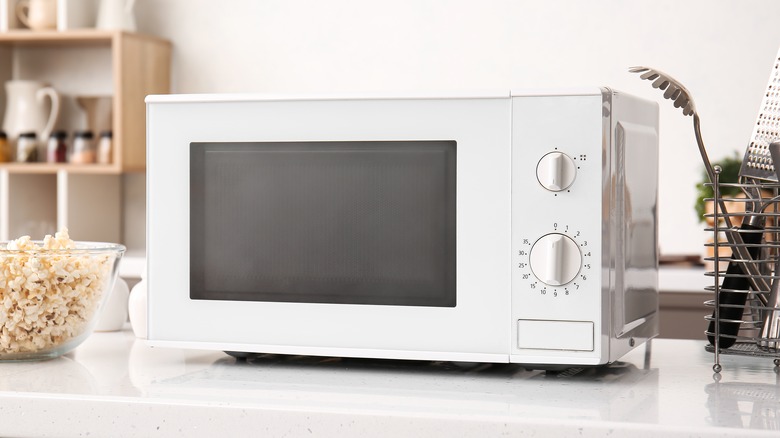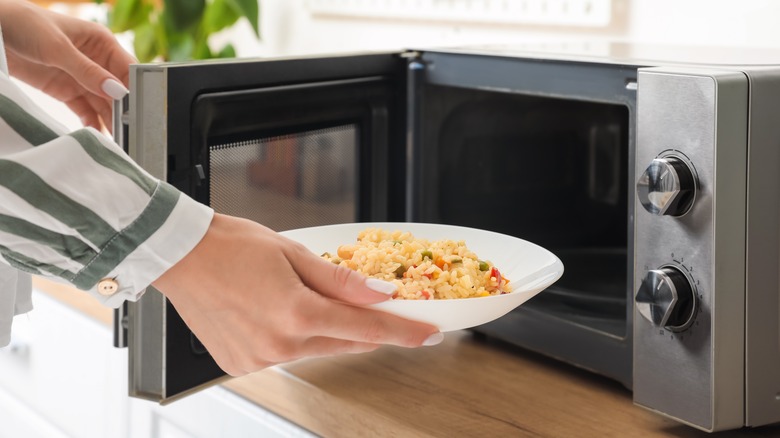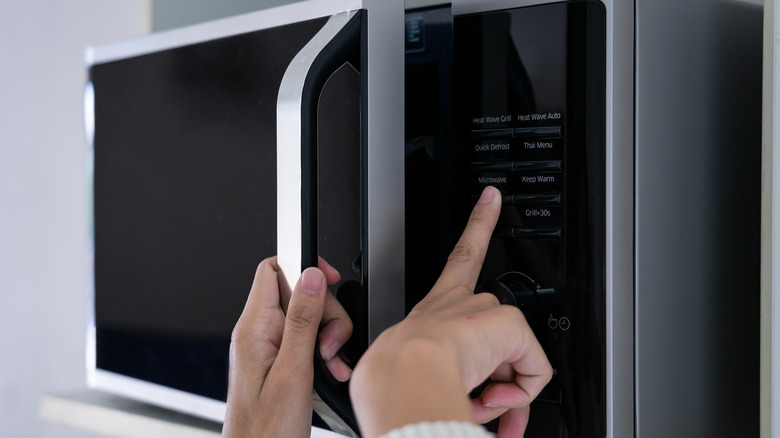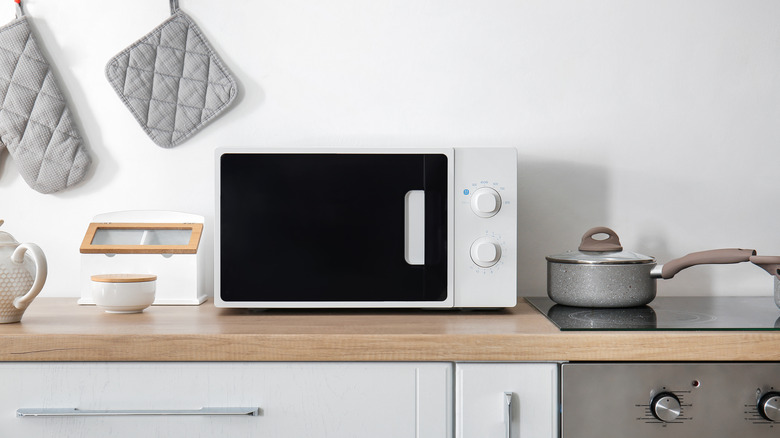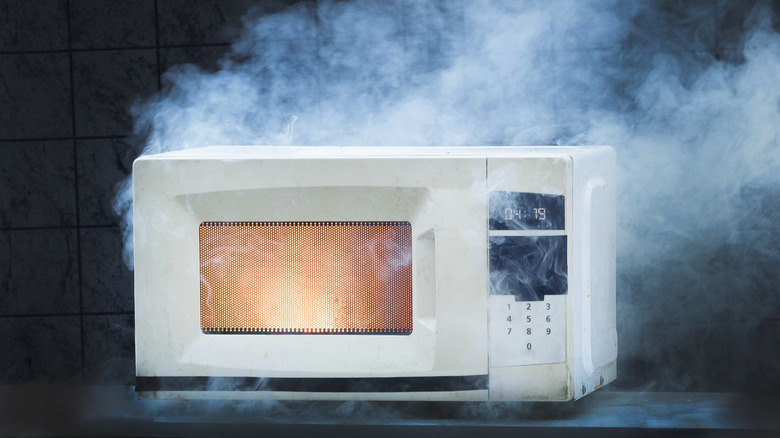Here Are The Signs Your Microwave Is Too Old
Microwaves are one of the most innovative and convenient kitchen appliances to arise out of the 20th century. Whether it's a simple countertop model or a sleek built-in appliance, microwaves conveniently allow you to heat up and cook a variety of foods and liquids. Though the small appliance did seem to fall out of favor for about a decade, between 2005 and 2013, it's since made a steady comeback, with consumer demand returning to about what it was prior to 2005, per Statista.
As for how a microwave cooks, its method has not been without debate. While more of an issue in the early years of the microwave, some people truly did fear the radiation used to cook food could cause cancer or other long-term ailments. That claim, however, has proved to be completely unfounded, per WebMD. Whereas something like an X-ray produces ionizing radiation, which can cause health issues if exposed to it in excess, microwaves produce non-ionizing radiation, which is completely harmless.
That being said, old and outdated microwaves do run potential safety risks. Not for your health, necessarily, but more so in terms of fire and electrical hazards. Microwaves aren't invincible appliances and should be replaced as they age and wear down for optimal performance and safety. Keep reading to know when it's time to ditch your old microwave.
1. It's over seven years old
There may not be anything discernibly wrong with your microwave — sometimes, appliances just wear out with age. According to Mr. Appliance, a well-cared-for microwave can last an average of roughly seven years. If you have a large family, use your microwave frequently, or don't properly care for it, though, that time frame shortens to four to five years.
There's nothing inherently dangerous about a microwave that's simply just old, but you run the risk of improperly cooked food with cold spots. Older electrical wiring can also be dangerous, and can potentially lead to electrical fires. Also, as BBC Science Focus warns, older microwaves may have worn down or non-existent seals, which could mean some radiation escapes in the cooking process. This isn't necessarily dangerous, but it isn't ideal. If you insist on using an old microwave that's otherwise fine, just be sure to keep an eye on the wiring, seals, and other compromising elements.
2. Unevenly cooked food
The sole purpose of your microwave is to heat up and cook food, whether that be leftovers, a bag of popcorn, or a frozen meal. Microwaves aren't perfect machines, and may occasionally leave a cold spot or two in your food. However, if your microwaved food is coming out cold more often than hot, it's likely past its prime.
That doesn't mean you should toss out your microwave immediately — there are some potential underlying causes besides age and wear that could lead to unevenly cooked food. According to Viva Flavor, microwaves affect different ingredients and food densities differently. Watery textures absorb microwaves better than harder ones, for example, meaning soup may heat up quicker and more evenly than a pasta dish.
This also means that combining a lot of different foods at once will lead to some heating up faster and better than others. Similarly, stacking your food high will mean only some parts are hit with the microwaves. You can fix this by cooking in batches, stirring frequently, or using different microwave settings. If none of these tricks are working, and your food is still coming out uneven and cold, odds are it's time to ditch your old microwave.
3. Faulty buttons
Over time and with repetitive use, you may find your microwave's keypad and buttons wearing down, and potentially stop working altogether. If some buttons still work, your microwave still may be usable, but it's a pretty good indication your microwave is getting too old to be functional. It also may render it completely useless.
However, if you have a newer microwave or one you think still has some life left in it, it may be a simple technical error that you can either fix yourself or hire a professional to help with. The two main potential issues at play are the membrane switches and the control panel, per A to Z Appliance Service.
If you're not experienced or comfortable working with electronics, it's advised that you contact a professional to come to service your microwave. If you decide to investigate the problem yourself, consult your microwave's manual for further instructions, and take care to unplug and discharge your microwave before doing anything to it to mitigate the risk of electric shock.
4. Loud noises
While there's some degree of tolerable noisiness associated with most microwaves, if the noise becomes excessive or more concerning, your microwave may be seeing the last of its days. However, that largely depends on the type of noise.
For example, a rattling noise may just be coming from an improperly placed or dirty turntable, per Authorized Service. Try first to adjust the plate correctly, and if that doesn't work, remove the actual wheeled turntable and give it a good clean, paying special attention to the wheels. If it's still not turning and making a loud noise, you may need to replace the turntable or the whole microwave.
The motor fan could also be a potential cause for the loud noise. This fan helps move air out through the exhaust system, and can be a safety hazard if not attended to. While you can replace the motor fan, it may be worth it to replace the whole microwave in older models.
5. Burning smells or smoke
Ideally, you should be keeping an eye on your microwave and replacing it before it becomes a safety hazard. However, the clearest sign that your microwave is too old to be functional anymore is when it becomes a danger to use. Some clear signs of this are if your microwave starts to smoke or produce a burning smell when used.
There are some other reasons aside from age your microwave may start malfunctioning like this, though. Smoking, for example, can be caused by a dirty appliance. As Fred's Appliance explains, old food splattered on the walls of your microwave can heat up and start burning, leading to a smoking microwave. This can also cause a burning smell (via Panasonic).
Solve this by giving the inside of your microwave a deep clean, making sure to take safety precautions by unplugging it first. If this doesn't fix the smoke or burning smell, it's time for a new microwave.
